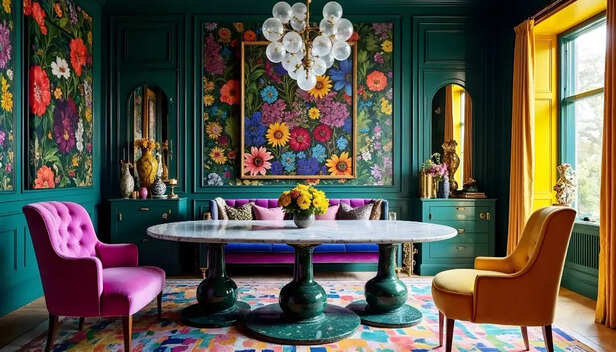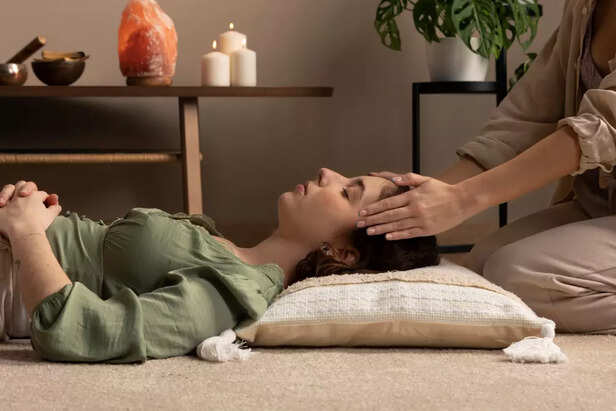The Weight We Carry: Why Indian Families Still Don’t Talk About Therapy
Manika | Aug 10, 2025, 23:50 IST
Therapy
( Image credit : Unsplash )
In many Indian families, therapy is still a taboo, seen as weakness, luxury, or “something for others.” This silence forces people to carry emotional burdens alone, masking pain behind smiles. This article explores why mental health conversations remain rare in our homes, how cultural conditioning fuels stigma, and why breaking this cycle is essential.
“Akele toh sab theek hai, sabke saamne rona nahi.”
This single sentence so deeply rooted in Indian households sums up our complicated relationship with mental health.
We belong to a culture where we are taught how to tie a dupatta properly before we’re ever taught how to untangle our thoughts. In most Indian families, therapy still carries the weight of shame, misunderstanding, and silence. But here’s the truth: we’re not okay. And we haven’t been for a while.
![Leave your emotions here]()
You can sit across your parents at the dinner table every day and still feel like a stranger.
You can laugh with your cousins at weddings and still go to bed numb.
You can touch your grandmother’s feet and still not feel grounded.
We come from families that are emotionally close but mentally far. We’re told we’re loved, but we’re rarely asked how we really feel. The default solution for every emotional breakdown is a cup of chai, a nap, or “talk to your friends.”
But what if the mind needs more than that?
For many, going to therapy feels like saying your parents failed. That’s not true—but that’s how it’s perceived.
When a young adult tells their family they want therapy, the reactions often range from:
You could be battling anxiety. You could be mourning the loss of your own identity. But your family will still worry more about “log kya kahenge” than “what are you going through?”
In India, illness is only acknowledged when it shows up in lab reports. Emotional pain? It's either dismissed as weakness or romanticized as "sensitive nature."
So, most of us carry our trauma silently. We smile in family photos and spiral when the lights go out.
![Say no to Therapy]()
When parents never went to therapy, they pass down coping mechanisms instead of healing. That’s why we grow up with:
Therapy isn’t just for healing you—it’s for breaking generational cycles.
Unlike older generations, today’s youth is beginning to unlearn the shame around vulnerability. We’re the first ones to use words like trauma, attachment issues, burnout, and boundaries.
But it’s not easy to be the first one to heal in a family that’s been in survival mode for decades.
It means hearing:
When you don’t talk about what broke you, you’ll end up bleeding on people who didn’t cause the wounds. You’ll self-sabotage. You’ll lose jobs, friends, relationships. You’ll keep asking: “Why am I like this?”
The answer often lies in years of unspoken pain and unprocessed emotions.
Therapy offers no magic fix. But it does offer clarity, space, and a chance to breathe without guilt. And in a world where everyone is pretending to be fine, that’s revolutionary.
![Choose Therapy]()
Choosing therapy is not a rebellion against your family it’s an act of love. Love for yourself, and for the next generation who might finally grow up without this silence.
You don’t heal by ignoring your pain.
You heal by confronting it.
And sometimes, healing looks like sitting in a quiet room with a stranger, finally saying the words you couldn’t say at home.
If you're the first in your family to go to therapy, you're not weak. You're courageous. You’re rewriting the story for everyone who comes after you.
Because one day, maybe your child will come to you and say, “I'm not okay,” and you’ll know exactly how to hold space for them.
That alone makes all the discomfort, the conversations, and the stigma worth it.
Explore the latest trends and tips in Health & Fitness, Spiritual, Travel, Life Hacks, Trending, Fashion & Beauty, and Relationships at Times Life!
This single sentence so deeply rooted in Indian households sums up our complicated relationship with mental health.
We belong to a culture where we are taught how to tie a dupatta properly before we’re ever taught how to untangle our thoughts. In most Indian families, therapy still carries the weight of shame, misunderstanding, and silence. But here’s the truth: we’re not okay. And we haven’t been for a while.
The Family Sofa Is Not Therapy

Leave your emotions here
( Image credit : Freepik )
You can sit across your parents at the dinner table every day and still feel like a stranger.
You can laugh with your cousins at weddings and still go to bed numb.
You can touch your grandmother’s feet and still not feel grounded.
We come from families that are emotionally close but mentally far. We’re told we’re loved, but we’re rarely asked how we really feel. The default solution for every emotional breakdown is a cup of chai, a nap, or “talk to your friends.”
But what if the mind needs more than that?
Therapy Feels Like Betrayal
When a young adult tells their family they want therapy, the reactions often range from:
- “Humare zamane mein depression nahi hota tha.”
- “Sab kuch toh hai tumhare paas, phir kya problem hai?”
- “Yeh sab angrezon ke chakkar mein mat pad.”
“Log Kya Kahenge” Still Rules
In India, illness is only acknowledged when it shows up in lab reports. Emotional pain? It's either dismissed as weakness or romanticized as "sensitive nature."
So, most of us carry our trauma silently. We smile in family photos and spiral when the lights go out.
Suppressed Emotions Become Inherited Baggage

Say no to Therapy
( Image credit : Freepik )
When parents never went to therapy, they pass down coping mechanisms instead of healing. That’s why we grow up with:
- Passive-aggressive silence instead of open conversations
- Emotional shutdown instead of conflict resolution
- Suppressed anger instead of healthy boundaries
Therapy isn’t just for healing you—it’s for breaking generational cycles.
Gen Z and Millennials: The First to Say “I Need Help”
But it’s not easy to be the first one to heal in a family that’s been in survival mode for decades.
It means hearing:
- “Tumhe toh sab kuch mila hai, kya dikkat hai?”
- “Yeh therapist kya batayega jo hum nahi samjhe?”
- “Bas overthinking hai, busy raho theek ho jaoge.”
The Cost of Silence Is Too High
The answer often lies in years of unspoken pain and unprocessed emotions.
Therapy offers no magic fix. But it does offer clarity, space, and a chance to breathe without guilt. And in a world where everyone is pretending to be fine, that’s revolutionary.
It’s Not Weakness, It’s Wisdom

Choose Therapy
( Image credit : Freepik )
Choosing therapy is not a rebellion against your family it’s an act of love. Love for yourself, and for the next generation who might finally grow up without this silence.
You don’t heal by ignoring your pain.
You heal by confronting it.
And sometimes, healing looks like sitting in a quiet room with a stranger, finally saying the words you couldn’t say at home.
It’s Okay to Be the First
Because one day, maybe your child will come to you and say, “I'm not okay,” and you’ll know exactly how to hold space for them.
That alone makes all the discomfort, the conversations, and the stigma worth it.
Explore the latest trends and tips in Health & Fitness, Spiritual, Travel, Life Hacks, Trending, Fashion & Beauty, and Relationships at Times Life!
